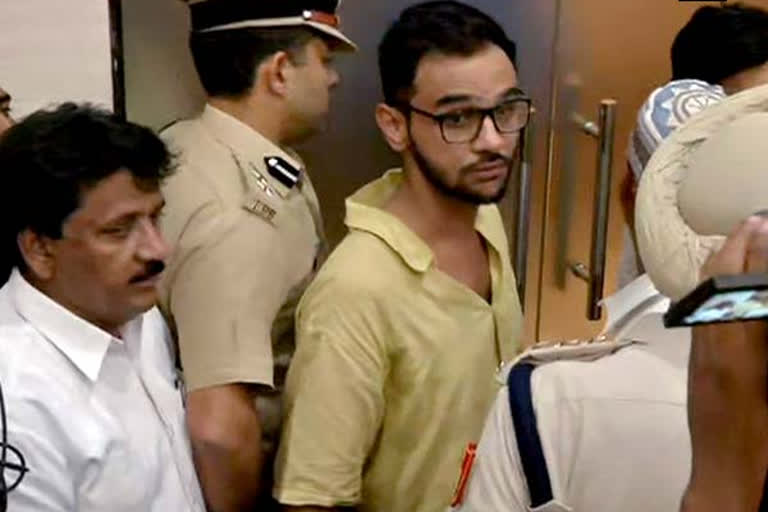New Delhi: Former JNU student Umar Khalid, arrested in a UAPA case related to the alleged conspiracy behind the riots here in February 2020, Monday contended before the Delhi High Court that the protests against the Citizenship Amendment Act were against an unjust law and it was in no way an act against the Sovereign. Khalid's counsel said several of the acts alleged or incidents cited against him by the police were not even qualifying as terror' and the protestors were not perpetuating violence as contemplated under the Unlawful Activities (Prevention) Act (UAPA).
A bench of Justices Siddharth Mridul and Rajnish Bhatnagar was hearing Khalid's plea challenging a trial court's order which had on March 24 dismissed his bail application in the case. Challenging the trial court's order dismissing his bail plea, Khalid's counsel contended that the special judge had said these were acts threatening the unity and integrity of India. He added that the protests were against an unjust law by persons who want to be part of the country and it is in no way an act against the Sovereign.
It is not perpetrating violence which Section 15 (terrorist act) of the UAPA contemplates, the counsel said. Who are we pointing this at? These are the people who said CAA is discriminatory and they want to be part of India, he said, adding that the protestors were opposing the alleged discriminatory criteria of granting or denying citizenship to a certain class of persons. While referring to a previous judgement, the lawyer said a terrorist act does not merely arise by causing disturbance of law and order.
During the hearing, Justice Mridul said as per precedents, terrorism is an act done with a view to disturb the even tempo of the society, create a sense of fear in the mind of a section of society, and was there any sense of fear instilled in anybody after the riots? To this, Khalid's counsel replied in affirmative and said the community most affected by the riots had that feeling of fear. He added that the alleged fear was not so grave and we should not fall in the trap of interpreting everything as terror. Regarding Khalid's alleged connection with Sharjeel Imam, the counsel said the two follow different ideologies and are not connected in any manner. They are divergent people with a different school of thought. Imam criticized a secular movement against CAA and I do not agree with it. I am being lumped with a person who calls for a deeply communal protest against CAA. There is no ideological meeting of minds, he argued.
Also read: Delhi riots 2020: HC to hear bail plea by Umar Khalid on May 19
The court listed the matter for hearing further arguments on May 24. The high court had earlier questioned Khalid for using certain objectionable words against Prime Minister Narendra Modi in his speech in Amravati on February 21, 2020. Khalid, Sharjeel Imam, and several others have been booked under the anti-terror law Unlawful Activities (Prevention) Act (UAPA) and provisions of the Indian Penal Code in the case for allegedly being the "masterminds" of the February 2020 riots, which had left 53 people dead and over 700 injured. The violence had erupted during the protests against the Citizenship Amendment Act and the National Register of Citizens. The trial court had dismissed the bail petitions by Khalid on March 24.
Khalid has argued in his bail plea before the high court that his speech, which forms the basis for the allegations against him, did not call for violence, was not contemporaneously uploaded on YouTube, was not widely circulated, and that the allegation of commission of the offence of section 124A (sedition) IPC or any reaction in Delhi on account of the speech was unfounded, unlikely and more than remote. The Delhi Police, represented by Special Public Prosecutor Amit Prasad, has opposed the bail plea, saying the narratives sought to be created by Khalid cannot be looked into as his defence at this stage and the trial court refused to release him by a well-reasoned order which suffers from no illegality.
Earlier, while granting time to the Delhi Police to respond to the bail plea, the high court had said that Khalid's speech was obnoxious, prima facie not acceptable, and that certain statements in the speech were "offensive per se". Besides Khalid, activist Khalid Saifi, JNU students Natasha Narwal and Devangana Kalita, Jamia Coordination Committee members Safoora Zargar, former AAP councillor Tahir Hussain and several others have also been booked under the stringent law in the case. PTI



